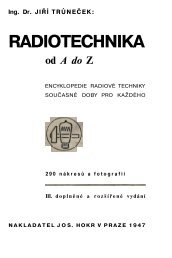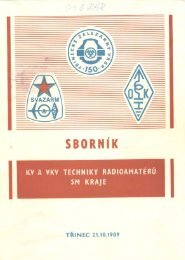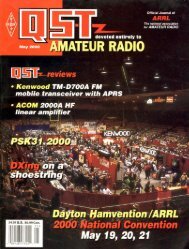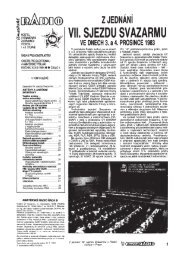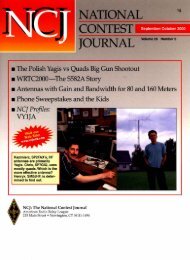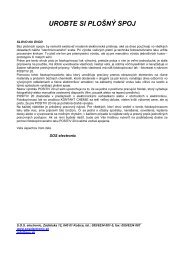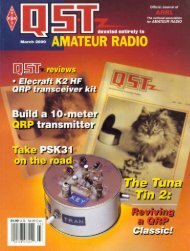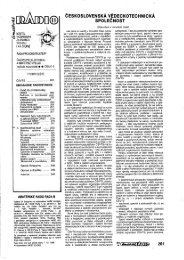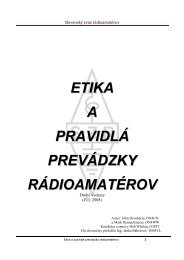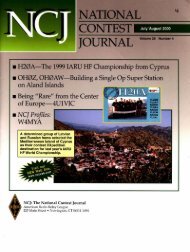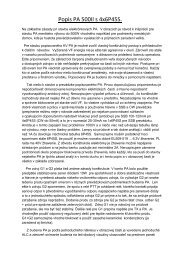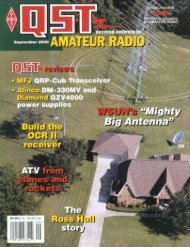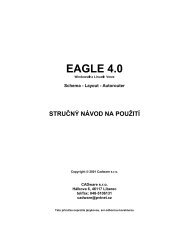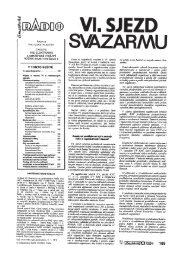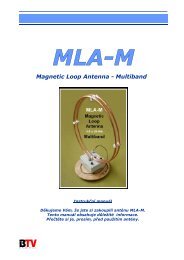You also want an ePaper? Increase the reach of your titles
YUMPU automatically turns print PDFs into web optimized ePapers that Google loves.
created using SDCHECK, the separate postcontest<br />
program provided with SD to<br />
generate entry files. The first version of<br />
SDCHECK supporting Cabrillo is 9.68. Start<br />
up SDCHECK then select Option 4 - Entry<br />
File. The Cabrillo file will be created in the<br />
same directory as SDCHECK. It will be<br />
named yourlog.LOG, where yourlog is the<br />
base filename of the SD log being processed.<br />
• WriteLog by W5XD—To create a<br />
Cabrillo file with WriteLog, pull down the<br />
Contest menu and click on Cabrillo File.<br />
In the screen that appears, make sure your<br />
sent information (ARRL section, category,<br />
power, etc.) is all entered correctly, then<br />
click OK. The Save As window appears<br />
showing the directory where the Cabrillo<br />
file (named yourcall.LOG) will be created.<br />
Helping The Contest Branch Serve You<br />
By Dan Henderson, N1ND, ARRL Contest Branch Manager<br />
Our goal in the Contest Branch is simple: provide accurate<br />
contest results to our participants. Several changes have been<br />
implemented that have allowed us to make great strides toward that<br />
goal. E-mail addresses for each contest have helped get logs to the<br />
correct queues for processing. A back-up server allows us to archive<br />
all e-mailed contest entries, so that original e-mails can be consulted<br />
if a problem arises. A listing of logs received at http://www.arrl.org/<br />
contests allows participants to verify basic information that affects<br />
their entry. And you, as a participant, can help us avoid problems by<br />
following a few easy guidelines.<br />
While more contesters are using electronic logging, we still<br />
receive approximately one-third of all logs in handwritten paper<br />
form. Handwritten paper logs will continue to be accepted for ARRL<br />
contests. There are generally three major problems we encounter<br />
with handwritten logs—all easily handled at the participant’s end.<br />
First, please make certain that you are using the most current<br />
forms and rules for the contest. Contest rules change occasionally<br />
and all participants need to make certain their information is up-todate.<br />
The latest forms and rules may be obtained three ways: (1)<br />
Send an SASE to the ARRL Contest Branch, 225 Main St,<br />
Newington, CT 06111 and request the forms; (2) download them<br />
from the ARRL Contest homepage at http://www.arrl.org/contest/<br />
forms; (3) request forms by e-mail to the ARRL Info Server (server<br />
guidelines are found in each contest rules announcement).<br />
Another problem we encounter with paper logs is that a<br />
participant may include entries for several contests in the same<br />
envelope. For example, in January 1999, we received one envelope<br />
from a participant, postmarked in late-January, that contained the<br />
following contest logs: ARRL Sweepstakes CW and Phone, ARRL<br />
160 Meter Contest, ARRL 10-Meter Contest and the ARRL RTTY<br />
Round Up. By combining the entries into a single mailing, four of the<br />
five logs were received after contest submission deadlines. Help us<br />
serve you by submitting only one contest entry per envelope (and<br />
clearly marking the contest name on the outside of the envelope).<br />
The final concern with paper logs is illegible handwriting. A<br />
recent handwritten entry included a tough-to-read call sign, which<br />
ended up wrong in the write-up. The entry, written in a sprawling<br />
script, had what appeared to be the letter W, but was in fact the letter<br />
U with an extremely long finishing tail. A simple matter to correct,<br />
but one that could have been avoided.<br />
Electronic logging, while taking contesting to new levels,<br />
nonetheless presents its own pitfalls. E-logs share a common<br />
problem with paper logs when they are either submitted late or sent<br />
to the wrong contest address. But what can the participant do to<br />
help eliminate problems with e-logs<br />
One of the most common problems we encounter is participant<br />
submitting the log and summary for the wrong contest. In fact, in<br />
every major contest we receive at least one such log! Recently a<br />
phone call was received from an individual upset that his 160-Meter<br />
Contest log had been “lost.” A check of the backup revealed that he<br />
had submitted a CQ World Wide summary sheet and an ARRL<br />
<strong>November</strong> Sweepstakes log!<br />
Many contesters will name their log files with some variation of<br />
the contest name and year. Imagine the confusion caused at the<br />
ARRL Contest Branch when lots of people submit files SSCW99.log.<br />
That is why the rules tell you to use your call sign for the file name,<br />
with an extension such as .log (ie N1ND.log). The partici-pant saves<br />
us time—and helps eliminate potential headaches—by using the<br />
required file naming protocols.<br />
The ARRL uses a different e-mail address for each event. E-mail<br />
sent to the wrong address has the potential to be overlooked. You<br />
should only submit the required files. When you send more than the<br />
required log files, you create the potential for saving the wrong file.<br />
You should only submit the file that contains the new Cabrillo log<br />
file! Please do not send other files, such as CTLog .bin files, NALog<br />
.qdf files, breakdown sheets, rate sheets, Excel spread sheets, or<br />
Word document files.<br />
Rules for contests do change. All of the major contest-logging<br />
software programs incorporate rules changes in their latest<br />
versions. If a new ARRL section is added, or if there is a new entry<br />
category, older copies of software may not be correct. You may<br />
miss or lose multipliers, be entered in a wrong category, or your<br />
software may not recognize the exchange that you try to log. The<br />
result is that your entry will have a problem, and your score may not<br />
be accurately reported.<br />
You should always verify that your summary information and log<br />
file are accurate before you submit your entry. Don’t assume that<br />
your software prepares correct summary information. You should<br />
open the log file and verify what it contains before you submit the<br />
entry. If your file doesn’t have all of the required information, your<br />
entry may be entered into a default category.<br />
E-mail is the easiest method of submitting your log. Before you<br />
send that e-mail, take a moment to make certain your file is<br />
complete. Recently, a contest-winning performance ended up with<br />
a major submission problem, one that was not caught until after the<br />
results had been printed. The log file appeared to have been<br />
truncated and, therefore, it was incomplete. In this case, over 500<br />
QSOs of the log were lost in the transmission. This sometimes<br />
happens when sending files over the Internet (I’ll leave it to the net<br />
gurus to explain how this happens). A good way to catch this is to<br />
e-mail yourself a copy of the file as a cc: to your submission to the<br />
League. The new Cabrillo file format (with its End of Log statement)<br />
gives us a way to verify complete logs are received.<br />
The old contest@arrl.org e-mail address is no longer valid.<br />
When you send your log to the correct address, you receive an<br />
automated response indicating that your e-mail has been received.<br />
Hold on to that receipt until the list of “logs received” is posted on<br />
the Contest Web page (or until the results are in print). If there is a<br />
problem with your entry or if it is missing, the response serves as<br />
proof of your submission before the deadline. If you have contest<br />
questions, send them to n1nd@arrl.org instead of the entry<br />
submission address.<br />
To summarize, here is a “Top Ten” list of ways you can assist us<br />
in “getting it right.”<br />
(1) Read and familiarize yourself with the contest rules before<br />
the event.<br />
(2) Use current copies of your logging program or paper<br />
summary sheets.<br />
(3) Verify that your summary information is complete and<br />
accurate.<br />
(4) If using paper summaries and logs, make certain all<br />
information is legible.<br />
(5) If using e-logging, submit the required Cabrillo file.<br />
(6) Send your entry before the 30-day deadline for submission.<br />
(7) Use the correct e-mail or postal mail address for submitting<br />
the entry.<br />
(8) Check to be certain your current mail and e-mail addresses<br />
are on your entry.<br />
(9) Electronically logged contests must submit their Cabrillo<br />
readable log files.<br />
(10) If you have questions, e-mail n1nd@arrl.org or call 860-<br />
594-0232.<br />
46 <strong>November</strong> <strong>2000</strong>



